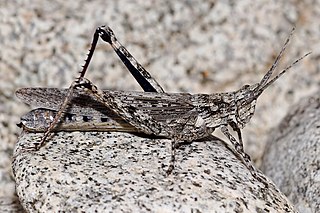
Acrididae, commonly called short-horned grasshoppers, are the predominant family of grasshoppers, comprising some 10,000 of the 11,000 species of the entire suborder Caelifera. The Acrididae are best known because all locusts are of the Acrididae. The subfamily Oedipodinae is sometimes classified as a distinct family Oedipodidae in the superfamily Acridoidea. Acrididae grasshoppers are characterized by relatively short and stout antennae, and tympana on the side of the first abdominal segment.

Ensifera is a suborder of insects that includes the various types of crickets and their allies including: true crickets, camel crickets, bush crickets or katydids, grigs, weta and Cooloola monsters. This and the suborder Caelifera make up the order Orthoptera. Ensifera is believed to be a more ancient group than Caelifera, with its origins in the Carboniferous period, the split having occurred at the end of the Permian period. Unlike the Caelifera, the Ensifera contain numerous members that are partially carnivorous, feeding on other insects, as well as plants.

The Calliptaminae are a subfamily of grasshoppers containing species found in Africa, Europe and Asia; some are economically important. It was originally erected as a tribe by G.G. Jacobson in 1905 as the "Calliptamini", later uprated by Dirsh in 1956.

The African rice grasshopper, Hieroglyphus daganensis is a medium-sized grasshopper species found in the Sahel region. Although not called a locust in English, this species shows gregarious behaviour and some morphological change on crowding and may become a moderately important pest species for small-holder farmers in the region.
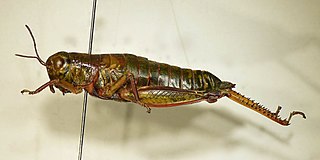
Chortopodisma is a monotypic genus of grasshopper in the tribe Podismini. Its only recognized species is Chortopodisma cobellii.
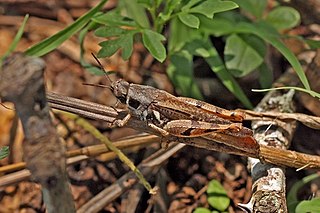
Catantops is a genus of grasshoppers in the tribe Catantopini and is typical of the subfamily Catantopinae. Species can be found in Africa, including Madagascar and subcontinental India.
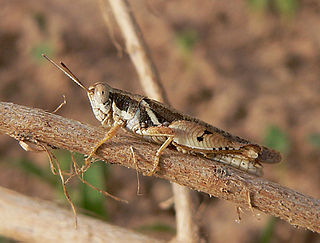
Cryptocatantops is a genus of grasshoppers in the subfamily Catantopinae, a group of insects primarily found in Africa. As numerous other genera, it is not yet assigned to a particular tribe.
Cryptocatantops debilis is a species of grasshoppers in the subfamily Catantopinae, a group of insects commonly called spur-throated grasshoppers. The type specimen was a female found in Omaruru, Namibia.

Omocestus is a genus of 'short-horned grasshoppers' belonging to the family Acrididae subfamily Gomphocerinae.

Tettigoniidea is an infraorder of the order Orthoptera, with six extant families.

Hieroglyphus is a genus of grasshoppers in the family Acrididae: subfamily Hemiacridinae and the tribe Hieroglyphini Bolívar, 1912. Species can be found in Africa and Asia.
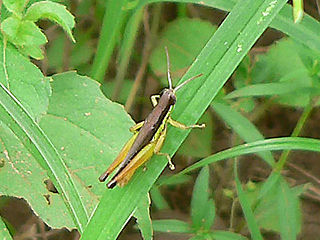
Spathosterninae is a subfamily of grasshoppers, based on the genus Spathosternum. Within the monotypic tribe Spathosternini there are currently 3 genera and about 12 described species recorded from Africa, the Indian subcontinent, south-east Asia and north-east Australia.

Kraussaria is a genus of grasshoppers in the subfamily Cyrtacanthacridinae with species found in Africa.

Kraussella is a genus of grasshoppers in the family Acrididae, subfamily Gomphocerinae.

Acorypha is a genus of grasshoppers belonging to the family Acrididae.

Brachycrotaphus is a genus of grasshoppers in the subfamily Gomphocerinae, erected by Hermann August Krauss in 1877. Species have been recorded from Africa, southern Europe and India.
Cryptocatantops allessandricus is a species of grasshopper in the Cryptocatantops genus.
Cryptocatantops crassifemoralis is a species of grasshopper in the Cryptocatantops genus found in southern Africa.
Cryptocatantops simlae is a species of grasshopper in the Cryptocatantops genus.
Cryptocatantops uvarovi is a species of grasshopper in the Cryptocatantops genus found in Somalia.















